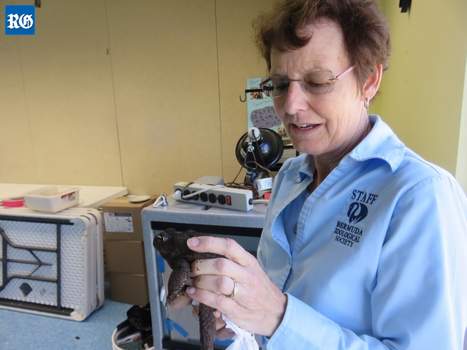Recent News
Seal Named “Northlands”, Set To Leave IslandMonday, March 20, 2023
The seal who was found on Clearwater Beach last month has officially been named Northlands — with Ruby Dill naming the seal after her granddaughter’s school — and Northlands will soon be traveling to the USA with the aim he continue his rehabilitation before being released back into the wild.
Plans Being Made To Send Seal To The USA
Saturday, March 18, 2023
The seal that was found in Bermuda last month — which is only a few weeks old — is “eating six pounds of fish a day, gaining weight, and generally doing well,” and plans are being made to send him to the Mystic Aquarium in Connecticut, with the same facility that accepted the seal that was found here in 2019, set to assist again.
BZS Trunk Island Cottage Receives Upgrade!
Friday, March 17, 2023
Thanks to the unwavering support of our donors, the Bermuda Zoological Society (BZS) has recently completed renovations to the cottage on Trunk Island – the BZS Living Classroom, the jewel in the crown of BZS education. The renovations have expanded the footprint of the current island classroom to encompass an expansion of the sheltered porches for outdoor learning while also providing storage areas for teaching tools.
Over 500 People Attend Lionfish Chowder Event
Friday, February 24, 2023
Chiko&T’s Restaurant won both the People’s Choice and Judge’s Awards at the BZS Lionfish Chowder competition, while The Cloud at the Waterfront, Wahoo’s Bistro, the Loren and the Spot Restaurant claimed second and third place honours.
HSBC Announced as Lead Sponsor of BZS Micro Forest Project
Monday, February 20, 2023
With the impacts of climate change being felt more and more each year, the need for reforestation projects has arguably never been more important and urgent. The Bermuda Zoological Society (BZS) today announced that HSBC has thrown its weight behind increasing Bermuda’s biodiversity, as Lead Sponsor of the BZS Micro Forest Project – Bermuda's Official Micro Forest Initiative.
About
GovernanceAbout Us
Newsletter
Latest News
Gift & Bookstore
Contact
General Inquiries
info@bzs.bm
Latest News
All the latest updates and news from the Bermuda Aquarium, Museum, and Zoo, one of Bermuda's leading visitor attractions!
Jonathan Bell
Published May 10, 2018 at 8:00 am (Updated May 10, 2018 at 6:53 am)

Combination of factors: Jamie Bacon, a researcher and educator for the
Bermuda Zoological Society, looks after a toad exhibiting
deformities from pollution (Photograph by Jonathan Bell)
Bermuda’s “safest form of pest control” is under threat from water pollution, a researcher who has tracked the island’s cane toad population for about 20 years warned yesterday.
Jamie Bacon, the principal investigator for the Bermuda Amphibian Project, run by the Bermuda Zoological Society, said a fall in the toad population meant a boom for nuisances such as centipedes. Dr Bacon added: “I wouldn’t be surprised if centipedes are able to move into areas where they haven’t been before.”
She said cane toads were rare in the East End of the island, so centipedes thrived as a result.
Dr Bacon added the insects often invaded homes and can deliver a painful sting.
Dr Bacon said she had heard centipedes had appeared in new locations such as Somerset and Spanish Point, although there was no data to show the extent of their spread.
Dr Bacon, an education officer at the Bermuda Aquarium, Museum and Zoo, has spent 20 years tracking cane toad deformities caused by hydrocarbon pollution.
The BZS’s wetland research has found a variety of other contaminants — including toiletries and antibiotics that have worked their way into island ponds after being flushed down toilets.
Dr Bacon said: “It shows you that what comes out of our cesspits does not go straight down, but can move laterally in the water table.”
A combination of factors have hit the island’s cane toads, a major consumer of insects like cockroaches, which were introduced to the island in the 19th century.
The amphibians secrete poison that makes their eggs and tadpoles toxic to most predators.
But the young toads that make their way on to land are prey for birds, particularly another introduced species, the yellow-crowned night heron.
Dr Bacon said: “We’ve also lost a lot of cane toad breeding sites, so that when the cane toads in your yard die off, there are often no places nearby where toads migrate from to replace them.”
Dr Bacon added: “We don’t know yet what effects the toiletries might be causing, but we feel they aren’t having nearly the effect that we see with the hydrocarbons and metals which are at much higher concentrations.”
Cane toads, the world’s largest species, originated in South America but have been introduced worldwide to eat agricultural pests — and have become pests themselves.
Bermuda’s cane toads began to show deformities in 1998 traced to hydrocarbon pollution, which also interfered with their ability to reproduce.
The zoological society has run a wetlands remediation programme that won support from HSBC in 2014, and has cleaned up Cloverdale Pond in Smith’s and Evans Pond in Southampton. Dr Bacon warned: “This is what we’re seeing in wildlife — keep your eye on anything like this happening to people.”
Tadpoles can be collected at this time of year from toad breeding sites and raised for release into gardens, as long as there are wet places for them to take cover during the day.
Dr Bacon said medicines can be burnt or disposed of at pharmacies instead of flushing them down toilets. She added: “You can also use the least toxic pesticides that you can.”


